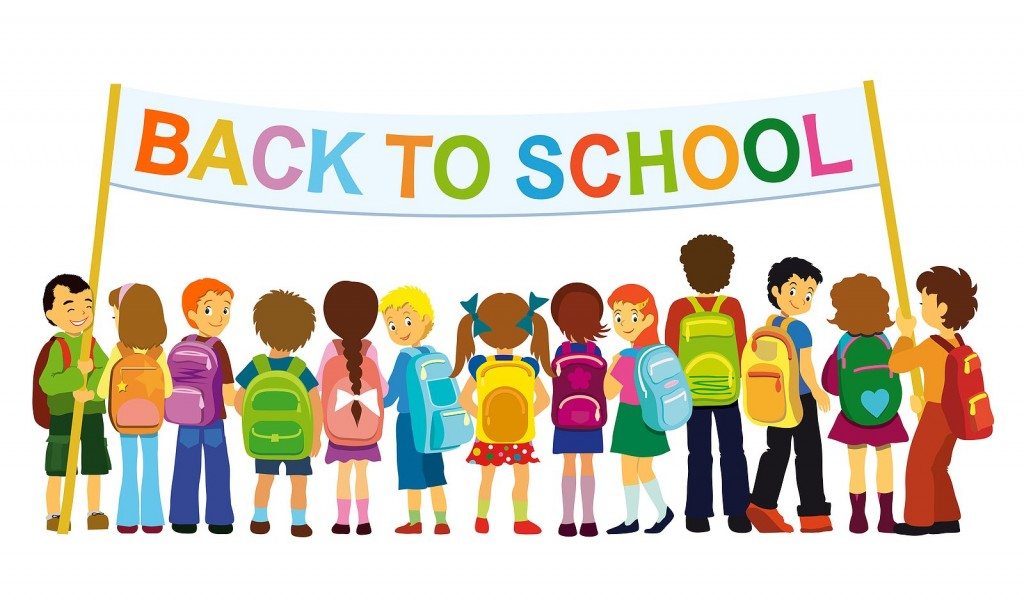Back-to-school transition is hard for the entire family, whether you had a jam-packed summer of activities and trips or a stay-cation.
I summarised a list of back to school tips that I am using to prepare myself and my family for the upcoming school year, and I hope that some of them will also help you prepare your kiddo for school and also get you organise and ready for a busy, but successful school year.
Back to school preparations can be exciting for kids so make it a fun experience for everyone! Get your kiddos involved by having them write their list, and marking things off; making it a family tradition for every year.
GOOD PHYSICAL, DENTAL AND MENTAL HEALTH
• It’s a good idea to take your child in for a physical, dental and an eye exam before school starts.
• Most schools require up-to-date immunisations, and you may be asked to provide paperwork showing that your child has all the necessary shots and vaccines.
• Discuss any concerns you have over your child’s emotional or psychological development with your paediatrician. Your doctor can help determine if your concerns are normal, age-appropriate issues or require further assessment. Your child will benefit if you can identify and begin addressing a potential issue before school starts.
• Schools appreciate the efforts of parents to remedy problems as soon as they are recognised.
MAKE COPIES
• Make copies of all your child’s health and emergency information for reference. Health forms are typically good for more than a year and can be used again for extracurricular activities, and the following school year.
REVIEW ALL OF THE INFORMATION
• Review the material sent by the school as soon as it arrives. These packets include important information about your child’s teacher, room number, school supply requirements, sign-ups for after-school sports and activities, school calendar dates, bus transportation, health and emergency forms, and volunteer opportunities.
MARK YOUR CALENDAR
• Make a note of important dates (school holidays…they popped up quickly!), especially back-to-school nights. This is especially important if you have children in more than one school and need to juggle obligations. Arrange for a babysitter now, if necessary.
COMMUNICATE WITH TEACHERS AND THE SCHOOL
• Contact your child’s teachers at the start of the school year. Get acquainted with them and let them know you want to be an active partner in helping your student to learn and grow.
• Plan to keep track of your child’s subjects, homework, activities and progress throughout the school year.
VISIT SCHOOL WITH YOUR CHILD
• If your child is young or in a new school, visit the school with your child. Meeting the teacher, locating their classroom, locker, lunchroom, etc., will help ease pre-school anxieties and also allow your child to ask questions about the new environment. Call ahead to make sure the teachers will be available to introduce themselves to your child.
RE-ESTABLISH THE BEDTIME AND MEALTIME ROUTINES
• During the summer, children aren’t always on a schedule. But, proper rest is essential for a healthy and productive school year. Best to re-establish the bedtime and mealtime routines (especially breakfast) at least 1 week before school starts.
• Prepare your child for this change by talking with your child about the benefits of school routines in terms of not becoming over tired or overwhelmed by school work and activities. Include pre-bedtime reading and household chores if these were suspended during the summer.
SELECT A SPOT TO KEEP BACKPACKS AND LUNCH BOXES
• Designate a spot for your children to place their school belongings as well as a place to put important notices and information sent home for you to see. Explain that emptying their backpack each evening is part of their responsibility, even for young children.
PROVIDE HEALTHY MEALS
• Hungry kids can’t concentrate on learning, so good nutrition plays an important role in your child’s school performance. Studies show that children who eat healthy, balanced breakfasts and lunches do better in school. Fix nutritious meals at home, and, if you need extra help, find out if your family qualifies for any Child Nutrition Programs, like the National School Lunch Program.
FREEZE A FEW EASY DINNERS
• It will be much easier on you if you have dinner prepared so that meal preparation will not add to household tensions during the first week of school.
BUY SCHOOL SUPPLIES EARLY
• Try to get the supplies as early as possible and fill the backpacks a week or two before school starts.
• Older children can help do this, but make sure they use a checklist that you can review.
• Some teachers require specific supplies, so save receipts for items that you may need to return later.
MINIMISE CLOTHES SHOPPING WOES
• Buy only the essentials. Summer clothes are usually fine during the early fall, but be sure to have at least one pair of sturdy shoes.
• Check with your school to confirm dress code guidelines.
• Common concerns include extremely short skirts and shorts, low rise pants, bare midriffs, spaghetti strap or halter tops, exposed undergarments, and clothing that have antisocial messages.
DEVELOP GOOD HOMEWORK AND STUDY HABITS
• Create an environment that is conducive to doing homework. Children need a consistent work space in their bedroom or another part of the home that is quiet, without distractions, and promotes study.
• Older children should have the option of studying in their room or a quiet area of the house. Younger children usually need an area set aside in the family room or kitchen to facilitate adult monitoring/supervision
• Schedule ample time for homework.
• Establish a household rule that the TV and other electronic distractions stay off during homework time.
• Make it clear that education is a top priority in your family: show interest and praise your child’s work.
TURN OFF THE TV
• Encourage your child to play quiet games, do puzzles, flash cards, colour, or read as early morning activities instead of watching television. This will help ease your child into the learning process and school routine.
• If possible, maintain this practice throughout the school year. Television is distracting for many children, and your child will arrive at school better prepared to learn each morning if he or she has engaged in less passive activities.
By ajoshi


